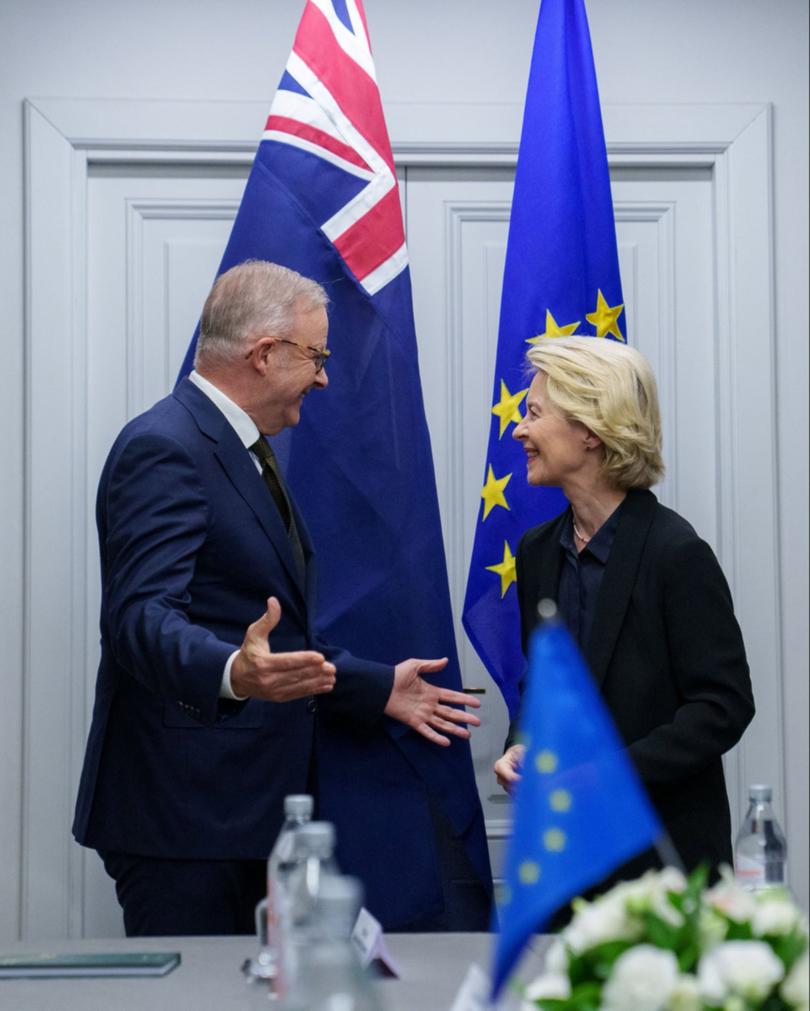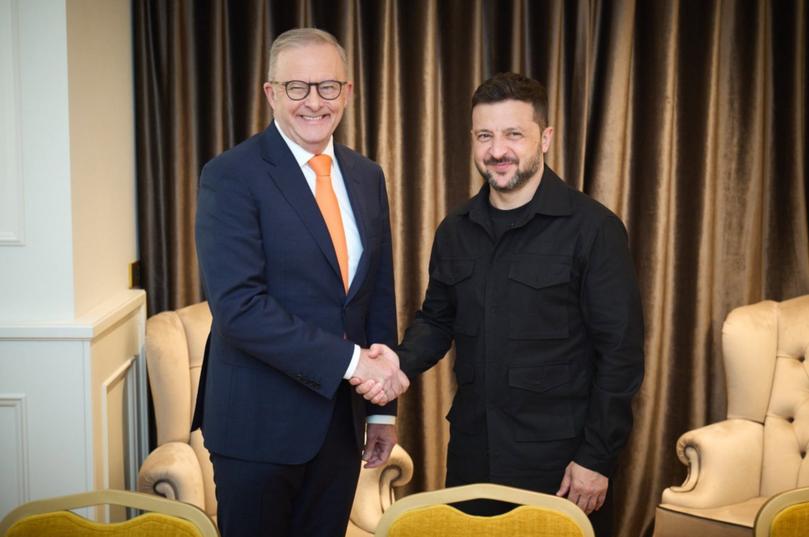Anthony Albanese plays down defence and security proposal ahead of EU trade talks
Europe wants a major strategic partnership with Australia but the PM is playing down the prospect of a giant defence trade deal.

European Commission Chief Ursula von der Leyen has proposed a defence and security agreement that would potentially enable Australian access to Europe’s massive remarmament build-up.
President von der Leyen made the offer during her one-on-one meeting with Anthony Albanese in Rome.
But Prime Minister Anthony Albanese instantly downplayed the idea as an “assertion” and “suggestion” and expressed stronger support for a standard trade deal between Australia and the EU which previously collapsed over a fight on beef quotas.
Sign up to The Nightly's newsletters.
Get the first look at the digital newspaper, curated daily stories and breaking headlines delivered to your inbox.
By continuing you agree to our Terms and Privacy Policy.President von der Leyen told Mr Albanese that she wanted a “new era” in ties and urged the two jurisdictions to contemplate a broader partnership than just selling goods to one another.
The pair met on the sidelines of Pope Leo XIV’s inaugurationation in Rome on Sunday.

“We meet here in Rome to celebrate the new era in the Vatican,” President von der Leyen said.
“So perhaps you could say we also are looking forward to a new era between Europe and Australia.
“We do not only see you as a trading partner, but we see you as a strategic partner, and we would very much like to broaden this strategic partnership.
“For example, we have signed security and defence agreements with South Korea and with Japan, soon with the UK.
“We would be very pleased if we could develop such a security and defence partnership too, just to broaden the strategic partnership in many topics that we have in common.”
But when The Nightly asked Mr Albanese if he was interested in signing Australia up to the more ambitious partnership, he appeared lukewarm.
“We said that we were certainly interested in any further engagement of support, but it’s very early stages at this point,” he said.
“So we should imagine that future discussions may take place either at NATO or on a bilateral basis between Australia and the European Union.
“This was just a suggestion that Ursula von der Leyen raised.
“There was no detail further, it was really an assertion of Europe’s values being consistent with Australia’s values, and in what ways could be explored — further defence cooperation.”
The European Union is releasing up to €800 billion in debt for member states to spend on boosting their defences. This funding is separate to NATO — the US-led military alliance that US President Donald Trump has threatened because of Europe’s poor record on defence spending.
The EU’s huge injection of funds is earmarked for European nations to spend primarily on domestic defence companies but carve outs are proposed for a €150 billion fund for nations that sign strategic partnerships with the EU.
The European Union, under Ms von der Leyen, has become more geopolitical and security oriented in light of the war in Ukraine and the COVID pandemic which began in China.
The security partnerships that it has signed with Japan and Korea state that Europe regards the threats to the continent and the Indo Pacific as inter-connected.
Japan, Korea, Australia and New Zealand comprise the Indo-Pacific 4 group of nations that have been invited to the last three NATO summits in the wake of Russia’s illegal invasion of Ukraine and Europe’s increased focus on the threat posed by China.
The Prime Minister also met Ukraine’s President Volodmyr Zelensky on the sidelines of the Pope Leo XIV’s inaugural mass on the steps of St Peter’s Basilica at the Vatican in Rome.
“During our campaign I made it clear that the Australian government position that I lead is very supportive of your struggle,” Mr Albanese told President Zelensky.

“The Russian illegal aggression needs to be resisted and we stand with UKraine very clearly and unequivocally.
“Ukraine has to be able to determine your future enough to have something imposed on you.”
He said Australian tanks were on their way to Ukraine and repeated that he was willing to join the Coalition of the Willing being formed by French President Emmanuel Macron and UK Prime Minister Keir Starmer.
“It’s always at strange hours in Australia, some very late-night meetings that I have participated in,” Mr Albanese observed.
A Coalition of the Willing would potentially involve peacekeepers to secure any peace deal struck between Russia and Ukraine that would likely be brokered by the United States.
President Trump will call President Zelensky and Russia’s Vladimir Putin on Monday. On Sunday, Mr Zelensky met US Vice President JD Vance and they shook hands at the Pope’s mass in what constituted much warmer scenes following February’s ugly Oval Office encounter when the US leaders berated Ukraine’s war-time leader.
President Zelensky thanked Australia for its military support but Mr Albanese said no further aid was requested at their meeting.
“Thank you very much for your military support, for your strong words and supporting the coalition of the willing,” Mr Zelensky said.
“I think that it’s not strange we are both allies.
“I think it’s great that we have so many allies in different continents.
“Together, we can really move this situation to closer to peace, with pressure on Russia.
“And we are very thankful for sanctions. I wanted to raise with you also this topic which is very important, to put more pressure, more sanctions on Russia.
“And I hope that we can have a real just peace, what we need for our people.
“And thank you for the news of the tanks.”
Mr Albanese returned the gratitude, thanking Ukraine for their assistance regarding the case of Australian man Oscar Jenkins, who Russia has jailed for fighting on behalf of Ukraine.
But it was not clear that whatever assistance Ukraine had provided would lead to any immediate breakthrough, such as an inclusion in a prisoner swap.
Mr Albanese was just one of many world leaders Mr Zelensky met during his trip to the Vatican where 151 world leaders and dignatories, including 55 reigning monarchs, gathered for the inaugural mass of Pope Leo XIV.
The Vatican estimated that around 150,000 well-wishers turned out for the two-hour ceremony underneath clear skies and warm sun on Sunday morning.
Mr Albanese, sporting an Akubra hat, met the Pope and described his attendance at the “moving ceremony” as a “privilege”
